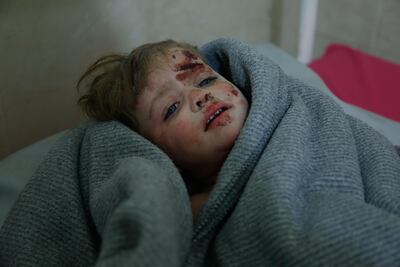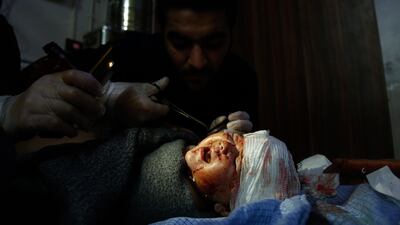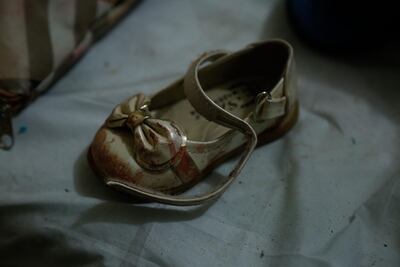The UK is not doing enough to save the sick and injured in besieged Syria and should be prepared to concede some political ground to Russia in order to do so, says a leading charity figure.
Hamish de Bretton-Gordon, who is involved in the negotiations to evacuate sick children from besieged Syria, has called on the UK prime minister and foreign secretary to do more to safeguard the lives of civilians and medics.
Last week, the government permitted Red Cross teams to evacuate 29 critically-ill patients from the Syrian rebel-held enclave of Eastern Ghouta, but many are dying while stuck on the waiting list to receive treatment. A significant number of the hundreds of people in need of help are children.
“The West has let these children down,” says Mr de Bretton-Gordon, a director of Doctors Under Fire and an adviser to the Union of Medical Care and Relief Organisations (UOSSM), which operates in Eastern Ghouta.
Speaking to The National, Mr de Bretton-Gordon says that UK leader Theresa May and foreign secretary Boris Johnson are not doing enough to help those in need in Syria considering Britain's resources and diplomatic weight.
“I call upon the Prime Minister and Foreign Secretary to be bold and seize the initiative in Syria to stop the killing and enable the millions who have suffered so much [to see a] glimmer of hope for a better future,” he says.

Twenty-five civilians are reported to have been killed in air strikes on two towns in the rebel-held Eastern Ghouta area outside Syria's capital, Damascus on Thursday. Most of the victims died in Russian air raids.
At least nine women and two children were among the 18 people killed in Misraba, one of the towns.
Some 400,000 people in the area have been under siege by Russian-backed Syrian government forces since 2013. The UN reports that nearly 12% of children in Eastern Ghouta are suffering from acute malnutrition.
Mr de Bretton-Gordon, who has negotiated with the offices of Syrian president Bashar al Assad and Russian President Vladimir Putin, says that the British leaders should be putting pressure on Mr Putin to stop the bombings.
“It's Armageddon in Syria every day - and the West is doing nothing,” he says.
Mr de Bretton-Gordon, a British Army officer for 23 years, says the situation in Syria “is a crime against humanity” and that those caught up in the fighting, including young children, are being attacked daily and have little access to food, education, help and are running out of hope.
__________________
Read more
At least 28 civilians killed in Syria, most in Russian air strikes: monitor
The fight to evacuate seven children with cancer from Syria
Breakthrough aid in Syria 'not enough' to save malnourished children
__________________
As one of the five permanent members of the UN’s security council, Mr de Bretton-Gordon believes “the UK has the diplomatic and military skills to be a leading light to bring a better future for Syria”.
Based off his own experiences of the conflict, he suggests that Britain should be prepared and apply pressure on Russia to stop the killing of civilians and medics in the besieged area of Syria.
“In recent weeks when David Nott and I have been negotiating the release of children with cancer from Ghouta it is evident that Russia is pulling the strings. President Putin can stop this killing and Mrs May and Boris Johnson should focus on him,” he says, conceding that the UK “may have to give some political ground to achieve this”.
Speaking ahead of the Astana and Geneva Peace talks later this month, he argues that now Russia and the Syrian Regime have won the battle for control of Syria and ISIL have been defeated militarily, the West should become fully engaged because “it is the West who will have to foot the bill to rebuild Syria”.
The British, US and France are distracted and not focussing on the Middle East and Syria, he says, specifically adding that in Britain is too locked in on Brexit and domestic issues such as a health care system in crisis which the prime minister been forced to publicly apologise over.
“The attacking of hospitals and medics at the moment [is] so poignant when our own hospitals in the UK are struggling not with war but flu and lack of money,” Mr de Bretton-Gordon says.
He argues that the UK must ensure a fitting representative attends the upcoming peace talks and that Britain could help supply troops to serve as UN Peacekeepers on the ground during a ceasefire.
“Boris Johnson suggested British troops might be available for this task last year. The British Army is still the best in the world at this ‘muscular’ humanitarian aid and with our major military bases in Cyprus a few miles off the coast of Syria would be an excellent staging and logistic base to launch from”.
Eastern Ghouta is designated a "de-escalation zone" by Russia and Iran, the government's other main ally, along with Turkey, which backs the rebels.
But hostilities intensified in mid-November, when the Syrian military stepped up air and artillery attacks on the enclave in response to a rebel offensive.


